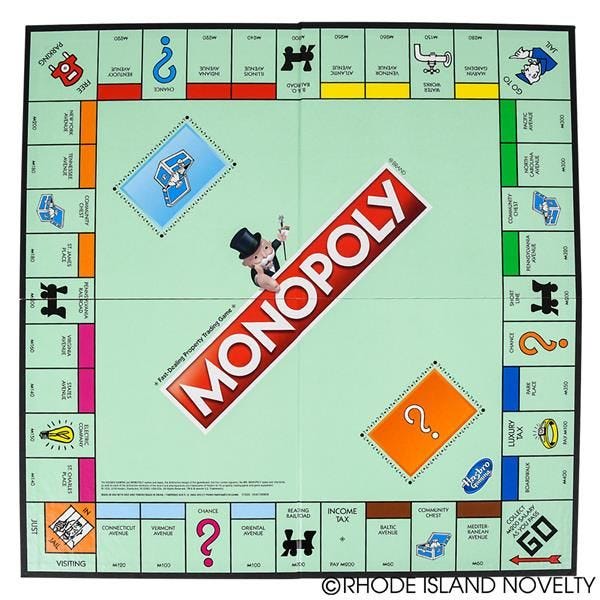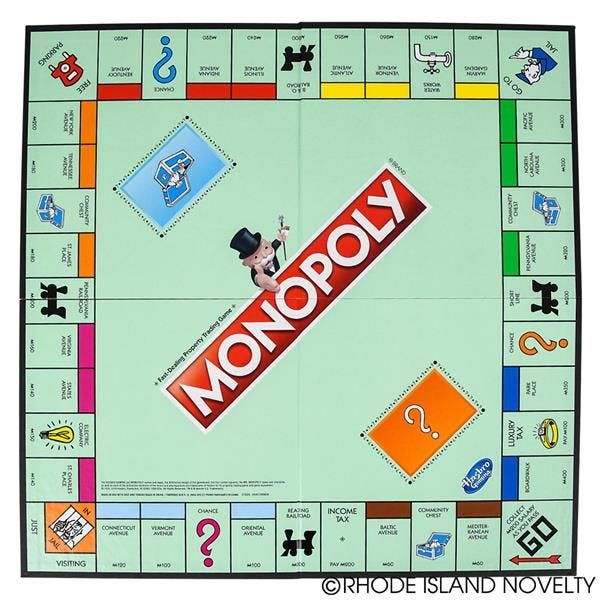Every math teacher, math tutor, parent, nanny, or other adult who has helped kids with their homework has gotten the question: “When will I ever use this in real life?” about mathematics.
Just for fun, here’s how to use a little math and, more importantly, a little mathematical thinking, to always win when you play Monopoly.
How to Win at Monopoly
The key to crafting a winning strategy for Monopoly is understanding the roll that the dice play in how the game flows. This is very simple arithmetic, but requires a mental shift—to thinking in terms of probabilities.
Assuming that you play in the normal way, with two fair six-sided dice, then there are limited possibilities on each move.
The lowest number you can roll is 2, by getting doubles of a 1 on each die.
That is the one and only way to roll a 2.
The highest number you can roll is 12, by getting doubles of a 6 on each die.
That is the one and only way to roll a 12.
Now, notice that there are two ways to roll an 11. You can get a 6 on the first die and a 5 on the second die, or a 5 on the first die and a 6 on the second die.
That means that rolling an 11 is two times more likely than a 2 or 12.
And there are three ways to roll a 10. You can get a 6 on the first die and a 4 on the second die, a 4 on the first die and a 6 on the second die, or a 5 on both dice.
That means that rolling a 10 is three times more likely than a 2 or 12.
If you write out all the possible combinations and their sums, and then count how many ways you can get each sum, you will see that 7 is the most frequent roll.
Here’s a handy chart that shows the possible sums and how many different ways you can get them with two fair dice.
There are 36 possible combinations and 11 possible sums from two fair dice.
Notice that 6, 7, and 8 are the most frequent sums, with 6 and 8 turning up almost as often as 7.
This pie chart shows the percentage of the total that each sum represents:
Referring to the pie chart should help some of the strategies start to feel more intuitive.
And leads to my first tip:
Do Not Develop Boardwalk and Park Place
If you happen to land on them, buy them. They’re great bargaining chips, since most people desperately want to own them. But they’re ridiculously expensive to develop at $200 per house or hotel. And notice something about Park Place in particular: look at the board and count backwards 7 spaces from Park Place.
Seven spaces back from Park Place is “Go to Jail.” That means it’s impossible for the game’s most frequent roll to land you on Park Place: fully half that particular monopoly.
The awareness that 6, 7, and 8 are the most frequent rolls leads to the second tip:
Make Any Trade To Get the Orange Monopoly
I would trade Boardwalk and Park Place for the oranges anytime. I’ve won many times by trading Boardwalk and Park Place for the cheapest orange when it let me complete the orange Monopoly. (I always got cash too, because my opponents never understood the real value of the oranges. I’d have paid them.)
How does that work?
Notice the location of Jail. Remember that under the standard rules, rolling three doubles lands you in jail. There’s also Chance and Community Chest cards that send you to jail, as well as the Go to Jail square.
In a typical game, most players will go to jail many times.
Rolls of 6, 8, or 9 when leaving jail land you on an orange. Notice how much of the pie the 6, 8, and 9 slices take up.
Just shy of 40% of the time, people leaving jail will land on an orange. That’s excellent positioning to collect rents!
The orange monopoly is also fairly cheap to develop, at only $100 per house or hotel.
Do Almost Anything to Get All Four Railroads
Don’t give up your shot at the oranges, but short of that do anything to get all four railroads.
The key to winning at Monopoly is not going bankrupt when other players do.
Owning all four railroads gives you the income equivalent of passing go — $200 — quite regularly.
The railroads are spaced evenly around the board, and that means that a player is in danger of landing on one of them on almost every turn.
Also, there are cards that result in getting double rent on the railroads. Nice bonus!
Never, Ever Buy Hotels
The game has only 32 houses and 12 hotels. If you own a three-property Monopoly and put four houses on all your properties, you collect almost as much rent as you would for a hotel, but you control over a third of the potential development for the whole game.
The rent bump from two houses to three houses is massive, so you should put three houses on your Monopoly as fast as possible, and four when you can afford it. Then stop. Only agree to buy a hotel and release your control of four houses if you get something else for it — make it a bargaining chip in a trade to get more railroads!
Play By Standard Rules
The final tip: the one thing that prevents this strategy from working is “house rules.” Monopoly is notorious for these. The standard rules state that nothing happens on Free Parking. It is literally just a place to wait for your next turn.
But the most frequent “house rule” is paying all fines into the center of the board and letting players collect that money as a “Free Parking” jackpot.
Don’t do this.
That rule throws a monkey wrench into the game, so you can play your opponents into the ground and be poised to win on your next turn—but then a lucky Free Parking shot acts as a lottery ticket for your opponent, ruining the effect of all your smart play.
Conclusion
Monopoly has been part of American childhoods for a long time. It’s where many Americans first learned to count money, and long games of Monopoly with grandparents (or with cousins at Thanksgiving, or with friends at slumber parties, or or or or….) are wonderful memories.
But as these tips show, Monopoly can also be a place where you learn to use math a little more confidently, or — even better! — teach your kids to think mathematically in the service of a “real life” goal.
Go forth and get an orange Monopoly today!








Wow your monopoly analysis is excellent, thanks for putting it together. Hopefully you can show a whole new group of people how to think analytically like this! Such a powerful tool to be able to do this. Nice work fellow math nerd! 😀
First off, I never considered Monopoly as a way to teach Math to the kids. Brilliant idea!
Second, maybe now I can win faster instead of staying up in the wee hours of the night 😂